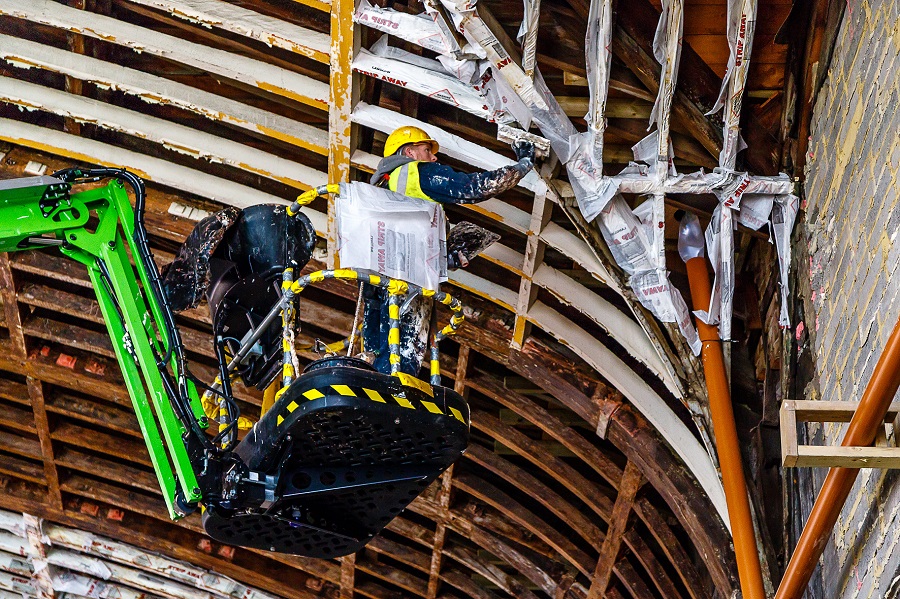
The Corn Exchange restoration project has been given almost half a million pounds of covid recovery cash.
Brighton and Hove City Council has received £458,920 from Arts Council England’s (ACE) Cultural Capital Kickstart Fund for its Royal Pavilion Estate regeneration project.
The grant is part of ACE’s allocation from the Department for Culture, Media and Sport’s £1.57 billion investment, designed to tackle the crisis facing cultural organisations and heritage sites. The funding will help to continue the refurbishment of Brighton Dome’s Corn Exchange and Studio Theatres.
The Cultural Capital Kickstart Fund has allocated £55 million for existing Arts Council capital grant holders who can demonstrate a capital funding shortfall due to Covid-19 related increased costs, reduced fundraising and/or an extended completion date.
The Grade 1 listed Corn Exchange was built in the early 19th century for the Prince Regent as his riding house and supper room and features unique heritage features, including the widest span timber frame in the country.
Councillor Phélim Mac Cafferty, leader of Brighton & Hove City Council said: “This award will help us continue the vital restoration of some of our most important heritage buildings.
“There is no doubt that Covid-19 has had a dramatic impact on our timetabled work as social distancing has meant scaling back and the finances of both the council and our cultural partners have been severely affected.
“We are extremely grateful to Arts Council England for their ongoing commitment to this project. As the work moves forward towards completion, we really look forward to seeing the venues open once more to offer a safe environment for artists, audiences and visitors.
“The Royal Pavilion Estate is our city’s pre-eminent cultural landmark attracting visitors to the heart of the city. The project aims to re-imagine these buildings in new ways, enabling better access and a wider range of cultural enjoyment for artists and communities throughout the city.”
The major refurbishment of the Corn Exchange and Studio Theatre is the first phase of a wider project to reaffirm Brighton’s Royal Pavilion Estate as a key cultural destination by equipping it for a sustainable future.
The longer-term vision aims to reunite the historic Estate to create a centre for heritage, culture and the performing arts which reflects the unique spirit of Brighton. It is anticipated that the revitalised Royal Pavilion Estate will support 1,241 full time equivalent jobs and have an economic impact of £68m.
Brighton Dome has also received a further donation for its capital fundraising campaign of £100,000 from the Garfield Weston Foundation, in addition to their original leadership gift of £250,000 in 2016.
The Garfield Weston Foundation is a family-founded, charitable grant-making foundation, which supports a wide range of causes across the UK, donating over £80 million annually.
Their support towards the project is to ensure the venues are equipped to serve diverse audiences and communities for future generations.
Andrew Comben, Chief Executive, Brighton Dome and Brighton Festival added: “Like so many other arts organisations in the city and across the country, Brighton Dome has faced financial challenges due to the Covid-19 pandemic.
The refurbishment of these historically important venues remains a beacon of hope in our future plans for bringing the arts back to our audiences and communities and to reinvigorate the city’s cultural recovery.
“We give our sincere thanks to Arts Council England and the Garfield Weston Foundation for their on-going support and belief in the project.”
Chief executive officer of the Royal Pavilion and Museums Trust Hedley Swain said: “We are very pleased that Brighton & Hove City Council has received this vital funding to continue the refurbishment of these historic venues.
“The redevelopment will bring together the Royal Pavilion Estate as an exciting, rich, cultural hub in the centre of the city to benefit residents and visitors alike.”
The redevelopment is estimated for completion in autumn 2021 and will improve venue access for visitors, staff and performers, including new accessible toilets, hearing assistance systems and a public lift providing wheelchair access to all levels of the buildings. A new Creative Space will be available for community groups and emerging artists to use for developing new work.






